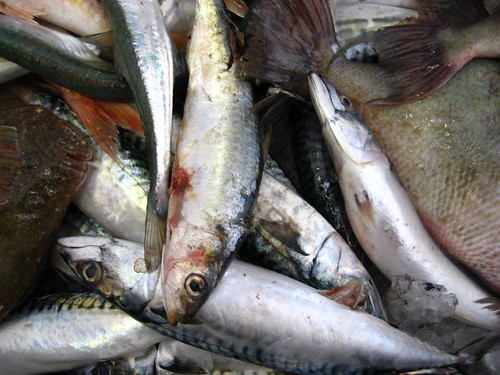 The Marine Conservation Society (MCS) has downgraded mackerel from its list of fish suitable to eat. The society says that international arguments about quotas mean it is no longer a sustainable choice.
The Marine Conservation Society (MCS) has downgraded mackerel from its list of fish suitable to eat. The society says that international arguments about quotas mean it is no longer a sustainable choice. It says that mackerel should now be eaten only occasionally and consumers should instead eat herrings or sardines. But UK fishermen say the downgrading is premature and could be counterproductive.
Mackerel has become increasingly popular in recent years, thanks in part to greater awareness of the health benefits associated with eating oily fish. It has also been endorsed by several celebrity chefs.
But as the interest in the species has increased, the fish itself has been on the move. Once found mainly in the north east Atlantic, in recent years the fish have tended to head north west towards Iceland and the Faroe Isles following their prey of squid and crustaceans.
Because it is found in greater quantities in their waters, the Icelandic and Faroese fishing industries have unilaterally decided to vastly increase the amount of the species that they catch.
This has upset Scottish fishermen for whom mackerel is a critical stock, with £164m landed in 2011. The EU and Norway are also involved in the dispute over quotas which so far has proved intractable in negotiations. The impasse has spurred the Marine Conservation Society into action. It has now removed mackerel from its "fish to eat" list.
"At the moment, the stock biomass according to the scientific data is above the levels that is recommended, however the number of fish being removed is above the target and too high," MCS fisheries officer Bernadette Clarke told BBC News.
"The stock is good for now but it is currently declining. It is now rated as a fish to eat only occasionally - it is not rated as one to avoid," she said.
Benedikt Jonsson, the Icelandic ambassador to the UK, issued a statement last year saying that his country has worked for years to get an agreement on mackerel fishing.
"We have repeatedly offered proposals that sustain the mackerel population and ensure a fair outcome for all countries," he said.
"Unfortunately, certain countries have responded with attacks on Iceland and threats of sanctions, while simultaneously demanding a vastly oversized portion of the mackerel catch. The facts are clear: Icelandic fishing is generally recognised as sustainable and responsible."
While the MCS says consumers should seek alternatives including herring and sardines, representatives of Scottish fishermen argue that the downgrading is premature."The stock is actually still well above the precautionary level, even if Iceland and the Faroes continue to do this," says Bertie Armstrong of the Scottish Fishermen's Federation.
"You can ignore the MCS advice this year."
Mr Armstrong is scathing about the way the Icelandic fishermen are fishing for mackerel, describing it as a "mugging job".
"The public is being fed the line by the Icelandic ambassador that the fish are coming into our waters and we are having a little go. That is just nonsense, they are having the maximum physically possible go," he said.
There have been 12 rounds of talks so far as political representatives try to hammer out an agreement on mackerel quotas. A spokesperson for the UK's Department for the Environment, Farming and Rural Affairs (Defra) said that this process was the only way forward.
"The continued sustainability of mackerel is vitally important and is increasingly threatened by the actions of the Faroe Islands and Iceland. We are extremely concerned that an agreement on fishing rights has not yet been reached. That is why the UK continues to seek a new agreement that is fair to all."
Source: The BBC
Photo courtesy of adactio via Flickr (CC BY 2.0)
